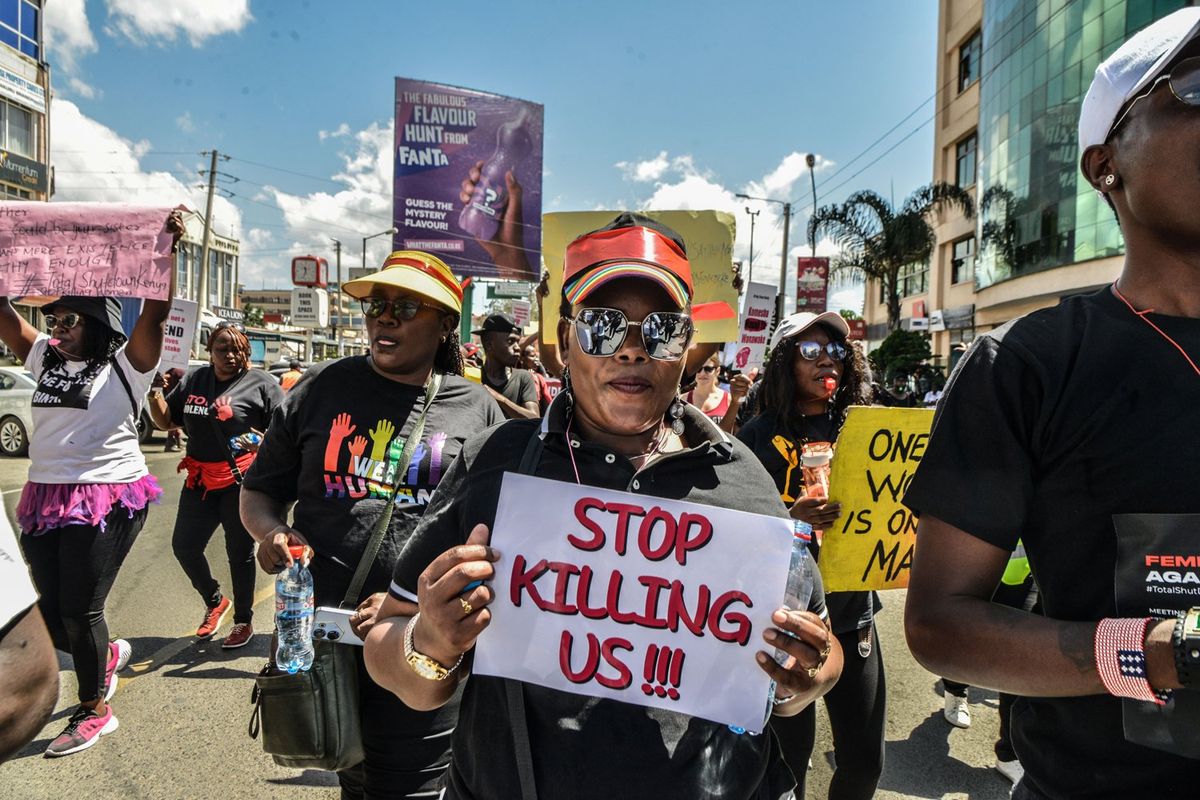Kenyan Women are Taking More Actions to End Femicide
The coordinators of the #EndFemicideKE protests are staging another civic action on the day of the opening of the Kenyan Parliament and County Assembly, to demand that women’s lives are secured and perpetrators are punished.

Protesters march while carrying placards and chanting slogans during the #EndFemicideKE protests in Kenya.
“You’re not safe; you go anywhere, you enter a taxi, you have to send the [location] link for your safety. You have to tell your friends that ‘I’m meeting this and this person,' you give them their number plate.” This is how Laura Oloo, one of the coordinators of the recent protests against femicide in Kenya, lives her life. This constant fear is why Oloo and thousands of people gathered at the end of January to protest against the alarming - and increasing - number of women who've been killed in Kenya since the beginning of the year.
The #EndFemicideKE movement, which Oloo is part of, is a collaboration between “over a thousand organizations and individuals nationally,” according to Muthoni Maingi, one of the coordinators of the movement’s resource mobilization, media and communications. As part of its efforts to secure the lives of Kenyan women, the movement is organizing its next set of protests for February 13. This is intended to coincide with the opening of Kenya’s parliament and county assembly.
“What we are pushing is that on the 13th, they actually table the demands that we have, and begin to be held accountable to each bullet point,” said Maingi. As well as this, #EndFemicideKE is coordinating a national vigil on the 14th, “to remember everybody that we have lost, but also as part of the awareness raising, and the engagement with the public to actually shift social norms and discussions around these issues.”
The 27th of January saw hundreds of people march through Nairobi’s City Centre, protesting against the shocking recent cases of femicide in Kenya. Since the year began, approximately 15 women have been brutally murdered across the country. Nairobi’s women, both young and old, took to the streets with a simple message: “Stop Killing Us!”
The protests were peaceful, but rage and anguish were palpable among attendees. “There was a lot of anger,” said Oloo.
These recent cases of femicide have shown just how unsafe women in Kenya truly are. Within a fortnight, social media influencer Starlet Wahu and university student Rita Waeni were both found murdered in short term rental apartments in Nairobi. Wahu was found stabbed to death, with bite marks on her body. Waeni was found dismembered in a trash bag dumped at a refuse collection point. They had entered the apartments with men the night before.
But these heinous crimes are not singular events, but the most visible episodes of a long-standing crisis of gender-based violence and femicide in Kenya. “Every other week there’s someone in our wards that I’m admitting because of sexual violence or intimate partner violence,” a medical student in residence at Kenyatta National Hospital told OkayAfrica, on condition of anonymity. Recently, they had a patient who was stabbed multiple times with a screwdriver by her husband, after she told him that she was pregnant.
Arguably, Kenyan society still upholds a culture that projects women as inferior dependents of men, and advocates for total submission of women to their male counterparts. Twenty-three percent of Kenyan girls are married before their eighteenth birthday, often the result of arrangements presided over by their fathers. Additionally, 21 percent of Kenyan women have undergone female genital mutilation, according to the advocacy organization Equality Now.
In Kenyan culture, “men and boys are to be feared. Men and boys who have grown up in cultures where they believe that to assert dominance, to gain value is to be violent,” said Maingi. “Essentially they’re being endorsed for their behavior. So, if they harm a woman it will always be ‘what did she do that made him do that?’”
Indeed, the responses to incidents of gender-based violence and femicide by Kenyan men across all strata of society are appalling in their misogyny. In March of 2021, Eunice Wangari Wakimbi was thrown from the balcony of an apartment on the 12th floor of a building by her boyfriend after rejecting his sexual advances. In response to this incident, radio host Shafi Weru urged that women should “stop being too available.”
“Are Kenyan ladies too available? Are they too loose? Are they too desperate? That’s why they get themselves caught up in such situations,” Weru opined on his live radio show. Similar responses by men blaming the victim and chiding women for being “loose” and “too available” are common throughout Kenyan social media.
So, what is the solution to this prevalent, deeply rooted blight on Kenyan society? “I think it always starts from a place of political acknowledgment; when people see that there are major consequences for doing these things, and you can’t just get out with a bond as easy as it is,” one protest attendee suggested.
Suspected perpetrators of gender-based violence and femicide in Kenya are freed from custody after providing a bond of 500,000 Kenyan Shillings ($3,100). According to Maingi, the Government needs to declare femicide an issue of national security. “The solution is having this conversation with children as they grow and involve men in the conversation,” said Oloo.
- Reeva Steenkamp's Death Highlights the Femicide Crisis in South Africa ›
- How a Global Pandemic Has Failed to Stop South Africa's Gender-Based Violence and Femicide Crisis ›
- In Kenya, Protesters Push for Women's Right to Life ›
- Why Kenyans Have Remained on the Streets in Protest - Okayplayer ›
- President Ruto Announces Budget Cuts in Response to Sustained Protests - Okayplayer ›
- Ethiopian Women Fight Femicide Despite Death Threats - Okayplayer ›
- Kenyan Women Marching for #EndFemicide Met With Police Violence | OkayAfrica ›

